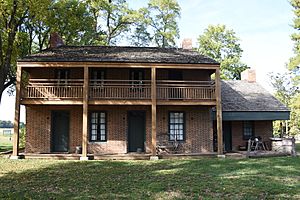Clayville, Illinois facts for kids
Quick facts for kids |
|
|
Clayville Tavern
|
|
| Location | 0.5 mi. SE of Pleasant Plains on IL 125 |
|---|---|
| Built | 1824 |
| Architectural style | Federal style |
| Website | http://www.clayville.org |
| NRHP reference No. | 73000718 |
| Added to NRHP | 1973-05-08 |
Clayville was once a small settlement along a main road in Illinois, near Pleasant Plains. It existed from 1824 into the 1850s. This little community was built around a busy tavern, which was a very important place for travelers back then. The tavern was on the main road between Springfield, the state capital, and Beardstown, a port town on the Illinois River. Today, the old Broadwell Tavern still stands, reminding us of this active frontier settlement.
Contents
A Busy Stop on the Road
The Broadwell Tavern was built in 1824 by a man named John Broadwell. He was an innkeeper and also developed land. He thought that Springfield, the nearby county seat, would grow. He knew people would need places to stop when traveling to and from the city.
In the 1830s, on the American frontier, a tavern was more than just a place to eat and drink. It was like a central hub for travel and supplies. Drivers of slow, horse-drawn wagons, called drays, needed a place to rest. Their horses also needed food and water. Illinois law even required taverns to offer these services to get a license. The Broadwell Tavern was not fancy, but its fireplaces kept guests warm. Its glass windows helped people wake up early to continue their journeys. The building was made in a simple Federal style.
Life at the Tavern
During its busiest time, from the 1830s to the early 1840s, the Sangamon River valley was connected to steamboat travel on the Illinois River by stagecoaches. Like wagons, stagecoaches also needed places to stop. Travelers needed food, sleep, water, and other refreshments. The tavern had a kitchen and a barroom on the first floor for guests. Sleeping rooms were on the second floor. Other visitors might have stayed in buildings next to the tavern that are now gone.
Travel to and from Springfield increased even more after it became Illinois' permanent state capital in 1837. The successful tavern attracted other settlers to "Clayville." John Broadwell named the settlement after Henry Clay, a political leader he admired. Broadwell's respect for Clay connected him to another local admirer: lawyer Abraham Lincoln. Records show that Broadwell hired Lincoln as his lawyer four different times.
Changes on the Road
In 1847, John Broadwell sold the tavern. By the 1850s, new railroad technology came to central Illinois. This meant people no longer needed taverns that served horse-drawn traffic. The stagecoach road was later paved for cars in the early 1900s, becoming Illinois Route 125. But this did not bring the old tavern back to life. The jobs at the tavern disappeared. The main settlement in the area moved to the nearby town of Pleasant Plains. The wooden buildings of Clayville vanished, leaving only the abandoned brick tavern.
Bringing History Back to Life
Starting in the late 1900s, people in Sangamon County began working to save the Broadwell Tavern. They also wanted to rebuild the wooden structures nearby. This was part of an effort to preserve history and create a local open-air museum.
For a while, a university tried to run the tavern and museum. But this effort failed in 1992, and the tavern was left empty again. It started to fall apart. However, in 2009, neighbors from Pleasant Plains began new preservation efforts. A nonprofit group called "Clayville Historic Site" was formed. This group is closely linked with the Pleasant Plains Historical Society. In 2010, they bought the abandoned tavern and the land around it.
As of 2015, the Clayville Historic Site hosts many events. These include a spring festival, a summer folk music gathering, a fall festival, and car shows. They also have a haunted house festival. The group has worked hard to restore the tavern's outside. They have also partly restored the inside to look like it did in the 1840s.
The Clayville Tavern was added to the National Register of Historic Places in May 1973. This means it is recognized as an important historic place.
 | James Van Der Zee |
 | Alma Thomas |
 | Ellis Wilson |
 | Margaret Taylor-Burroughs |


